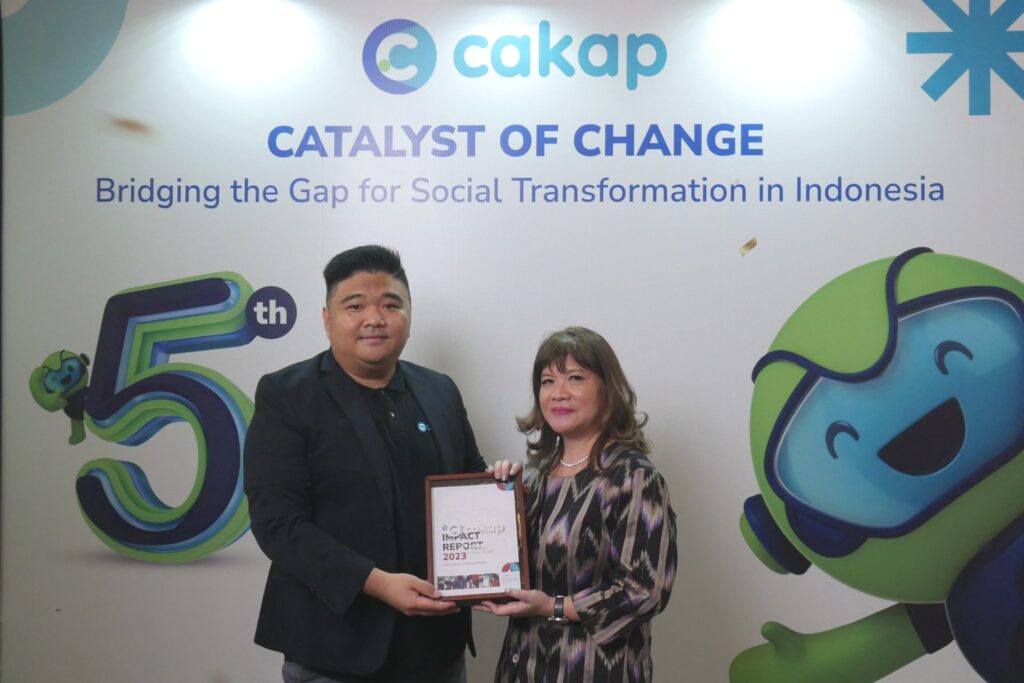Indonesian edtech company Cakap has unveiled its annual impact report titled “Breaking Barriers to Borderless Education.” The report details the company’s efforts and achievements in expanding educational opportunities to diverse age groups and regions, showcasing significant strides in providing accessible quality education.
Cakap has emerged as a major player in Indonesia’s education sector, now serving over 4.5 million students and nearly 2,300 teachers across 38 provinces. The company’s initiatives are tailored to meet diverse educational needs by dismantling obstacles to quality education and fostering an inclusive learning environment.
For instance, Cakap operates a corporate program designed for employee competency development, ensuring workers can maximize their professional performance through skill enhancements in foreign language proficiency and vocational skills. The company works with a wide range of clients through this program, including Grab, Protelindo, Siloam Hospitals, and more.
“Our impact report for 2023 demonstrates our dedication to enhancing the standard of living for Indonesian society through more inclusive educational access,” said Tomy Yunus, co-founder and CEO of Cakap.
The report was launched in tandem with Cakap’s fifth anniversary since its rebranding from Squline in 2019, commemorated with a celebratory event. The event featured notable figures, including Gita Wirjawan, former minister of trade of Indonesia, who emphasized the critical role of education in national development. “Indonesia, with its population of 280 million and a majority of productive young people, needs numerous skill development platforms for its human resources,” Gita said. “Education is key to building a nation’s civilization, making our young people competitive and relevant in changing times.”
Other attendees included Shinta Kamdani, chairwoman of the Indonesian Employers Association (APINDO), Dennis Pratistha, chief investment officer of Mandiri Capital Indonesia, Rahayu Saraswati, politician and women’s and children’s activist, and Arya Setiadharma, CEO of Prasetia Ventures.
During the event, these figures shed light on the multifaceted significance of education. Dennis discussed the investment landscape for education startups despite post-pandemic challenges, suggesting that Indonesians have become more willing to invest in quality education as awareness and income levels grow across the archipelago. In ASEAN, Indonesia currently ranks second highest in the number of students studying abroad, according to Dennis.
Meanwhile, Shinta focused on the importance of applying holistic sustainability principles in business. “Fundamentally, it’s about shifting the perspective first, starting with raising awareness about sustainability issues, education to prepare superior human resources, and adapting to the dynamics of a green economy and green jobs that will require relevant skills,” Shinta said.
“For example, understanding sustainability standards in green projects, knowledge about green technology, business intelligence for data analysis, and natural resource management skills combined with the ability to develop sustainable management strategies,” Shinta added.

Cakap’s latest impact report also outlines its collaboration with the Faculty of Psychology at the University of Indonesia and the research institute Advisia. The company focuses on sustainable development principles aligned with several UN Sustainable Development Goals (SDGs), including quality education, gender equality, decent work and economic growth, and reduced inequality.
Expanding its reach beyond Indonesia, Cakap has also provided access to education for students in East Timor. The introduction of the Cakap Kids Academy and the English assessment test (CEST) are part of its efforts to cater to a broad age range, starting as early as four years old.
Looking ahead, Cakap’s priority is to solidify its impact by transforming the Cakap Untuk Bangsa (CUB) initiative into a foundational program in 2024. The CUB initiative aims to further expand Cakap’s reach and impact, focusing on inculcating lifelong learning and offering equitable quality education to vulnerable and marginalized communities. These efforts have already borne fruit, assisting over 15,000 students from underserved areas such as Nusa Tenggara Timur, Papua, and Sumatera Utara, to gain access to educational resources.
“Our journey is driven by a single commitment to improve lives through education. We have witnessed firsthand the significant effects that quality education can have, with our students reaching more, dreaming bigger, and achieving farther than ever before,” Tomy said.
This article was written in partnership with Cakap.
